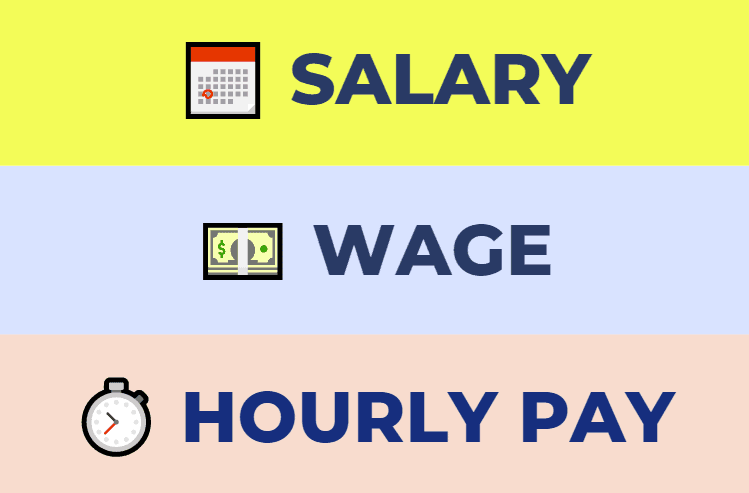Differences And Comparisons In Salary, Wage and Hourly Pay

Salary, Wage, and Hourly Pay
Many people confuse about salary wage and hourly pay, let’s learn more about these terms in detail. Here in this article, we have covered all the major differences and comparisons in salary wage and hourly pay. Keep reading and enhance your knowledge.
Salary
Salary is the payment of the agreed annual amount, which is paid at the agreed times (i.e., monthly or twice overnight). This arrangement is more effective and focused on working rather than focusing on working a set number of hours.
If your lead employee is covered by the Modern Award, you should make sure that his or her salary is equal to, or higher, what he or she would earn as a salary for the same role. This is called BOOT or Better Off Overall Test.
Salary is an agreed amount paid over 12 months. In most cases, it is generally expected that paid employees work overtime without pay for any additional overtime hours (provided their annual salary is not less than the minimum wage you are entitled to.
An easy way to think in this sense is that a role is the result of a focused task rather than a fixed performance or a set number of hours.
This is the idea that the worker was struggling with. They felt that if they worked long hours just a day or so, they would still be paid for the extra hours they worked. Besides, they feel that they should have a choice to return home rather than stay until the work or work they were doing is completed.
It is important to note that this employer did not usually ask his employees to work long hours, but when they did, it was for good reason.
In this case, the employer has decided to pay his employees an annual salary over the ‘prize pay’ instead of the hourly rate. The employer took into account the skills and knowledge required to perform the role, the minimum number of rights that would be required by the award, and other factors such as how often the role would be required to work overtime. All of these factors were considered in determining what the role of the salary would be.
We met with an employee who allowed their grievances which we were able to resolve successfully.
Wages
Wages are an employee’s salary based on the number of hours worked, multiplied by the hourly wage. These hourly rate payments are usually linked to the minimum rates stated within the Modern Medal. Hourly ‘Higher Awards’ hourly rates will also be considered wages.
The paid hourly rate seems straightforward, you get paid for the hours or half hours you work. Any hours added to your paid contract hours – if you are under the Enterprise Agreement or Award you may be paid even overtime rates for overtime – bonus!
This means that your pay can vary from week to week depending on the hours you work and there is a chance that you will earn more if you work more than your contract hours.
Hourly Pay
As an hourly employee, you get compensated for all hours worked.
Hourly workers are considered unpaid workers under the guidelines of Fair Labor Standards, which means they are eligible for overtime pay.
If overtime employees work during a typical 40-hour workweek, hourly employees are usually eligible for overtime. Overtime work pays off in half and half hours, so you would receive your normal hourly and half-hour pay for each hour you work.
Hours of operation may vary depending on a variety of factors. For example, some employees may have a schedule that they must adhere to for hours. Some hourly employees may have a shift schedule that changes every week, so the number of hours they spend will vary from week to week.
Hourly workers are entitled to earn at least a minimum wage. This salary varies depending on where you live. However, employers must pay their employees every hour the minimum wage of the state or organization, depending on the maximum.
Read Also: What is a six-figure salary?
Significant Differences Between Salaries and Wages and Hourly Pay
The following are the main differences between income and wages:
- Salary is a set amount of compensation paid for work performed. Wage is a variable amount of compensation paid based on hours spent completing a certain amount of work. Hourly pay means you pay a person a certain amount based on the number of hours worked, such as $ 20 per hour.
- The salary is given to talented people who use their skills in various fields and make a company income. Although wages are paid to low-skilled or unskilled workers such as a carpenter, a painter, an electrician, etc. working hours. The hourly rate, as the name implies, is the fixed amount paid for an hour’s work. So if your hourly rate is £ 10 and you work 8 hours a day, you will be paid £ 80 for that working day.
- Hourly rates are usually paid in salaries, calculated, and paid weekly or monthly. You will still have the same taxes as the national insurance contributions deducted from the final amount, and the remainder will be paid to you as cash or paid into your bank account.
- In the case of salary, the expenses incurred do not change which means that the fixed amount is paid monthly. Although in wages, costs vary, as they can vary in the day-to-day operation of the individual.
- Hourly pay is recognized as fixed costs. If you only pay for the number of hours worked on demand – which is usually the case when you hire temporary or contract workers or piece-workers – then it is considered a variable cost.
- Salary once fixed, in the beginning, remains unchanged. Although in the wage system, there is an ever-changing salary, and a person is paid based on the current salary level. The income of an hourly pay might be more vulnerable to changes.
- Hourly is paid at every hour employees work for a company And Salaries are usually paid at regular intervals i.e. monthly. Although wages are paid daily for the number of hours spent.
Comparison Between Salary, Wages, And Hourly Pay
| BASIS FOR COMPARISON | Salary | Wage | Hourly pay |
| Meaning | A steady salary that draws on the work he does every year.
|
The flexible pay that a person draws is based on hours spent completing a certain amount of work. | The hourly pay, as the name implies, is the fixed amount paid for an hour’s work. |
| Skills | Skilled personnel | Semi-skilled or unskilled | Highly skilled |
| Type of cost | Fixed | Variable | Keeps on changing |
| Rate of payment | Fixed-rate | Wage rate | based on a set hourly rate. |
| Payment cycle | Monthly | Daily | Hourly |
| Basis of payment | Performance basis | Hourly basis | At a given pay period |
| Paid to whom | Employees | Labor | Employees |
| KRA
(Key resultant area) |
Yes | No | Yes |
| Examples of profession | Doctor and lawyers | Bus driver and electrician | Air traffic controllers
Legal professionals Medical practitioners Dental practitioners Train and tube drivers |
| Leave | A salaried worker has a predefined schedule of paid leaves. | A wage worker has no such schedule and every day off is a day without a wage | An hour-long position will be paid for overtime, but slightly for weeks when you are out of work |


